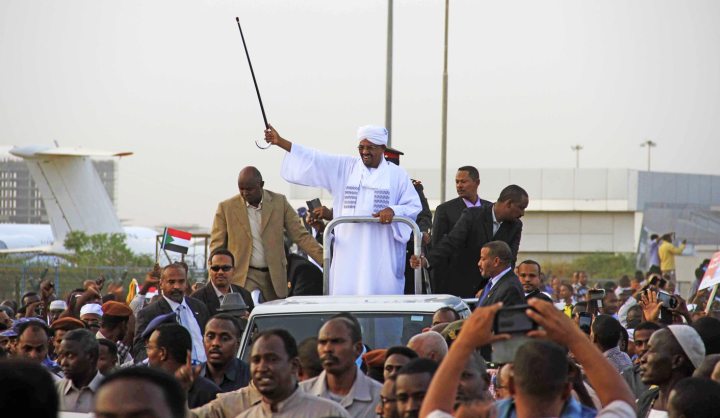Africa
Meanwhile, in Sudan, this is what al-Bashir’s been up to

As South Africa dissects the implications of President Omar al-Bashir’s visit, and his illegal departure, it’s worth remembering that although the International Criminal Court wants him for crimes committed years ago, the Sudanese President is still in power – and he’s still dropping cluster bombs on civilians. By NUBA REPORTS.
Omar al-Bashir, Sudan’s leader indicted by the International Criminal Court (ICC), slipped out of South Africa on Monday.
He escaped on a private plane after the nation’s High Court banned his departure. Al-Bashir has been accused of committing war crimes, crimes against humanity and acts of genocide in Darfur, a region in western Sudan where the government has been fighting to crush an insurgency since 2003.
Al-Bashir also leads the charge against rebel armies in the Nuba Mountains in Sudan’s southern lands. The Sudanese government dropped cluster bombs on Kauda, the capital of rebel-held territory in South Kordofan last month. Sudan is one of 22 countries, including Syria and Yemen, that has used cluster bombs since the end of World War II.
Shadia Omar and her family remained in danger two days after cluster bombs struck her home on 27 May. At least 58 unexploded bomblets lay scattered throughout her yard, next to the footpath where her neighbors pass.
“What can I do?” asked Shadia, a mother of two who farms, along with her husband. “We are just happy that God didn’t make this thing explode and destroy us. God is with us.”
The cluster bomb that landed on Shadia’s home was one of four that the Sudanese Air Force dropped at around 7:30 in the morning on 27 May. Three of the cluster bombs landed in fields outside homes. None of them exploded upon impact.
The bombings came weeks after Sudanese Army spokesman Colonel Alswarmy Khalid denied using cluster munitions in the Nuba Mountains of South Kordofan. His denial came in response to a Human Rights Watch report that found evidence cluster bombs were dropped on the Nuba Mountains in February and March this year.
Two days after the bombs hit the town, soldiers with the Sudan People’s Liberation Army North (SPLA-N), the rebel army that controls the region, came to remove the bomblets from Shadia’s home. They rolled the bomblets into a hole, covered them with dirt, and marked them with thorn bushes. When the bombs fail to explode, they become landmines, posing a threat long after they hit the earth.
If cluster munitions work as designed, they open in mid-air and release numerous explosive bomblets, or submunitions. These bomblets can saturate an area up to the size of several football fields, according to the Cluster Munition Coalition. “Anybody within the strike area of the cluster munition, be they military or civilian, is very likely to be killed or seriously injured,” the group says on its site.
A total of 116 states have joined the 2008 Convention on Cluster Munitions, prohibiting the use, production, transfer and stockpiling of cluster munitions.
The cluster bombs were not the only attacks on Kauda that day. Minutes after the Sukhoi jets attacked around 7am, a Russian-made Antonov dropped 11 additional bombs in the area.
Kauda is a bustling town of homes, schools, a mosque and a market. At this time of year, just ahead of the rainy season, families in Kauda and across Nuba can be found planting sorghum and other staple crops. As the rebel capital, Kauda is home to the ministry of education and other government departments of the Sudan People’s Liberation Movement North (SPLM-N), the political opposition movement in South Kordofan.
On Sunday, the South African High Court issued an order banning al-Bashir from leaving the country, citing his indictment by the ICC. Al-Bashir left South Africa on Monday afternoon. The court hearing over whether South Africa should prevent al-Bashir from leaving the country had not yet finished convening at the time of his departure. DM
Nuba Reports is a single topic media organisation that focuses exclusively on the internal wars in Sudan. All reporting is done by Sudanese journalists who live in the conflict zones.
Photo: A beaming Omar al-Bashir (C), President of Sudan, surrounded by security greets cheering supporters as he returns from South Africa to Khartoum, Sudan, 15 June 2015. According to reports al-Bashir quickly left South Africa where he was attending an African Union (AU) Summit, after the International Criminal Court (ICC), who have charged him with war crimes and genocide, issued a warrant for his arrest, which was upheld by a South African court, though the President had already left and it could not be upheld. EPA/MARWAN ALI



















 Become an Insider
Become an Insider